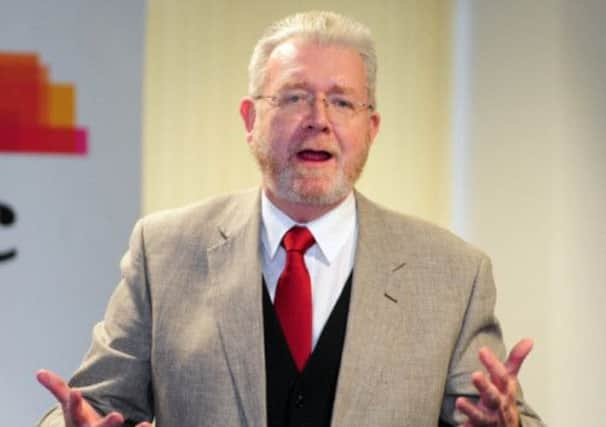Scottish independence: Russell rues lack of unionist novel


He believes that a dearth of pro-Union works of art contrasts with a blossoming of literature which is sympathetic to today’s Scottish nationalism.
Russell’s view has been expressed in a book on the writings of Scottish novelist Neil Gunn, who died aged 81 in 1973.
Advertisement
Hide AdAdvertisement
Hide AdRussell has contributed a chapter to the book, titled Nation And Nationalism, edited by Alistair McCleery and to be published at the end of this month.
In his chapter, Russell suggests that James Robertson’s “magnificent novel” And The Land Lay Still could mark a Scottish literary renaissance based on the potential for political change.
But alongside those artists who argue for independence, Russell said there should be an exchange of views and creativity with those from a different political standpoint.
“We should go further to encourage the creative artist to create for the times,” Russell writes.
“Where, for example, is the great unionist novel that looks forward to the flowering of new life in that old song? Where are the arguments for the keeping of Trident on the Clyde or the continuance of Tory welfare cut policies that are slicing the meagre benefits paid to the poorest?
“For we should hear them in our cultural world, just as much as we should hear the pro-independence polemic and warmly welcome Disney’s celebration of our scenery in Brave.”
Russell added: “Perhaps these examples are too pejorative. Instead I might ask where are the creators who see the benefits of the state we are in and where are they debating with those who do not?”
Others with a literary interest were not surprised that there did not appear to be a pro-Union literary movement.
Advertisement
Hide AdAdvertisement
Hide AdHonorary secretary of the Sir Walter Scott Club, Professor Peter Garside, said: “The Union has existed for 300 years. Nationalism is a burning issue, so it would be more likely to create a literary activism.”
Russell’s analysis of Gunn’s views on nationalism also contained a broadside against novelists who had criticised the SNP.
His anger was directed at CJ Sansom, the Scottish author of the best-seller Dominion.
In the book, published last year, Sansom described the SNP as “dangerous” and a “threat to all of Britain” in a historical note at the end.
Sansom, from Edinburgh, argued that beneath the “empty populist bonhomie of Alex Salmond, the prospective break-up of Britain is already creating a new culture of hostility and bitterness on both sides of the Border”.
Russell disputed Sansom’s view of the SNP, writing: “We should always eschew prejudice or lack of research. How disappointing, for example, has been the intervention in his latest novel Dominion of that fine historical novelist CJ Sansom, who clearly has never even met a member of the modern SNP and has not bothered to read, still less understand, the party’s impeccable democratic and social democratic history.”
Russell also took issue with Ronald Frame, the Glasgow-based writer whose novel The Lantern Bearers was long-listed for the Man Booker Prize and won the Saltire Society’s Book of the Year Award.
Frame has been critical of moves to put more Scottish works on the school curriculum, saying he was uncomfortable with the notion of Charles Dickens having to “slug it out” with Robert Burns, Sir Walter Scott or Lewis Grassic Gibbon.
Advertisement
Hide AdAdvertisement
Hide AdFrame warned that he was tempted to leave Scotland if it got more hung up on national identity.
Russell defended Scottish literature in the classroom, arguing that one cannot “be internationalist without having some rooting in your nation”.
On Frame, the education secretary said, the novelist had “fired a broadside… denouncing the Scottish Government and the SNP and claiming that an obsession with national identity would drive him and his like from the country”.
Russell writes: “He appeared to castigate me for, essentially, having dictated that no child in Scotland should read Dickens. To that, as to much else I read in the newspapers, I plead not guilty. Not only do I read Dickens, I believe others should too. However, I welcome Ronald Frame’s contribution. I think we should debate the implications of this ‘time of change’ and writers should take a role in that.”
Nation And Nationalism, edited by Alistair McCleery, is published this month by Whittles Publishing, Dunbeath, Caithness, price £8.99.
Twitter: @TomPeterkin